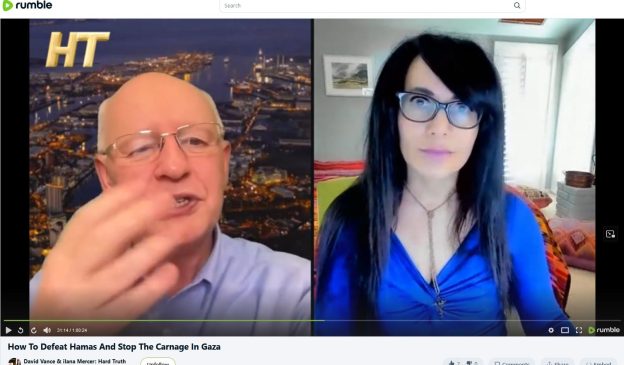Dead in the ruins of Gaza is the Israeli collective conscience—together with thousands-upon-thousands of Gaza’s civilians; dead or displaced for decades to come ~ilana
To refuse to bear witness to the war on Gazans—also the defining event of 2023 and the decade, twinned with COVID—is to be inhuman, insane, incoherent. To the Greek philosophers, to be mired in such contradiction was to be less than human, less than coherent, less than sane ~ilana
NEW COLUMN IS “Gaza Vs. Fallujah: Barbaric Blitzkrieg Highlights US Marine’s Superiority“. Or, “Gaza Vs. Fallujah: Just How Vampiric Are The ‘Vaunted’ Israel Defense Forces?” It was featured on The New American, at The Ron Paul Institute For Peace and Prosperity,” and the Mises Institute’s Power & Market.
I thank all my publishers.
I did some simple math—whose core truth obtains, although the numbers are already out of date, given the scale of the carnage. My editor provided another ratio, at the end, here https://www.ilanamercer.com/2023/12/gaza-vs-fallujah-barbaric-blitzkrieg-highlights-u-s-marines-superiority/ , which speaks to the proportionality imperative of Just War Theory, sundered by Israel.
Please consider that my last four tracts on Gaza, and that scroll of a blog, “Constantly UPDATED (12/13): ‘Total Warfare’ On GAZA: War Against Civilians Is War On Civilization“—all anatomizing the war on Gazans: These are tremendously painful to write, as a Jew and a former fierce defender of Israel.
But to refuse to bear witness to the war on Gazans—also the defining event of 2023 and the decade, twinned with COVID—is to be inhuman, insane, incoherent. To the Greek philosophers, to be mired in such contradiction was to be less than human, less than coherent, less than sane.
Excerpt:
“… Force-fed the fiction of the IDF as the most ethical fighting force in the universe; I set about to conduct a proportional, if limited, comparison. I compare like with like, albeit in limited but significant theatres of war: Israel’s offensive in Gaza against “Hamas,” in late 2023, to America’s onslaught in Fallujah against the Iraqi resistance, in 2004.
The battle in Fallujah is considered “the deadliest battle involving U.S. Marines since Vietnam.” “Eighty-two U.S. servicemembers died during the street-by-street, house-by-house effort to clear Al Qaeda from the city.” Officially, it is described as a “battle to retake the key city of Fallujah from a violent insurgency that was taking root across Iraq after the U.S. ousted Saddam Hussein.”
Before the American invasion of Iraq, Fallujah was a compact city of about 400,000 people. “Around 700 Iraqi civilians were killed over the course of the 2004 fight for Fallujah.”
Gaza’s population is about 2.4 million strong. The administrative chaos in war-time Gaza would hamper accurate records-keeping. That considered—and not counting individuals buried beneath the rubble—approximately 15,000 Gazans have been killed by Israel. (Haaretz, Israel News, Friday, December 2, 2023)
Let’s extrapolate:
Were Fallujah as populated as Gaza (2.4 million), the United States Marines would have killed approximately 4,200 Iraqi souls. This is a far cry from the Israel Defense Forces’ butcher’s bill of 15,000 civilians dead in Gaza—and climbing.
Were Gaza as small as Fallujah (400,000); the Israelis, befitting their butcher’s bill so far, would still have killed at least 2,500 souls to our Marines’ 700. Ceteris paribus, naturally.
Let that sink in.
On the numbers, I have been exceedingly charitable to the Israelis, given that their victims, buried beneath the rubble, are still mostly unaccounted for, and considering that the IDF resumed hostilities against civilians on December 1.
Both the Israeli and the U.S. militaries come in here for rough treatment. The fulminations of the Israel Firsters stateside aside, however, some American patriotism is owed amid the sorrow over Israel’s barbaric blitzkrieg.
Damning with faint praise though this may be, Americans, in the persons of our U.S. Marines in Fallujah—in the dubious theater of another unjust war—were righteous, compared to the monstrous Israel Defense Forces in Gaza. …
… THE REST is here: “Gaza Vs. Fallujah: Barbaric Blitzkrieg Highlights US Marine’s Superiority.” Or, “Gaza Vs. Fallujah: Just How Vampiric Are The ‘Vaunted’ Israel Defense Forces?”
The complete column is always posted eventually at IlanaMercer’s Weekly Column Archive.
UPDATE (December 17, 023):
These people at ZeroHedge, December 17, 2023, are, well, dishonest. https://www.zerohedge.com/geopolitical/4th-generation-devastation-west-has-been-targeted-cowardly-globalist-mind-war
Over the pages of The New American, first, this column mocked the Fourth Generation Warfare categorization—and ostensible benevolence. On December 4, 2023, I applied this the 4th Generation Warfare vs. 3rd Generation Warfare analysis to the current global woke military.
In an intellectually honest America, my iteration of the idea would have been credited on Zero Hedge:
In their recent military campaigns, America and Israel have waged what to the inexpert, keen observer is largely old-fashioned, Third-Generation Warfare—a blitzkrieg, by any other name, against civilian populations.
The ostensible use of “tanks, mechanized infantry, and close air support” to “collapse an enemy’s defenses” are really unthinking, disproportionate shows of brute military force, reliant on massive amounts of materiel.
Yet when military mavens predicted and depicted the next form of warfare; it was the contours Fourth-Generation Warfare that they were tracing. Fourth-Generation Warfare was to be the distinguishing characteristic of the modern military. Boosted by technology, “advanced” armies would be relying on “small, highly mobile elements, composed of very intelligent soldiers, armed with high technology weapons.” These precision units and attendant weapons were expected “to range over wide areas seeking critical targets.”
In addition to technology; predicted and depicted was a military whose central impetus was augmented by ideas. In America, the controversial changing of hearts and minds, historically, has included fomenting coups around the world with the connivance afforded by psychological operations.
Near as I can tell, Fourth-Generation war was meant to be smart; to see Mind dominate and direct materiel.
What is underway in Gaza, at 2023’s end, however, is the very opposite. I see madness for what it is. Dead in the ruins of Gaza is the Israeli collective conscience—together with thousands-upon-thousands of Gaza’s civilians; dead or displaced for decades to come. The razing and ethnic cleansing of Gaza by Benjmain Netanyahu, abetted by Joe Biden, his Uniparty accomplices and a complicit West: This appears to capture the kind of Third-Gen “capability” delivered by the modern, standing, Woke military.
https://thenewamerican.com/opinion/gaza-vs-fallujah-barbaric-blitzkrieg-highlights-u-s-marines-superiority/ (December 4, 2023)
* Screen pic of Gazans reduced to pre-industrial life, scrounging.




